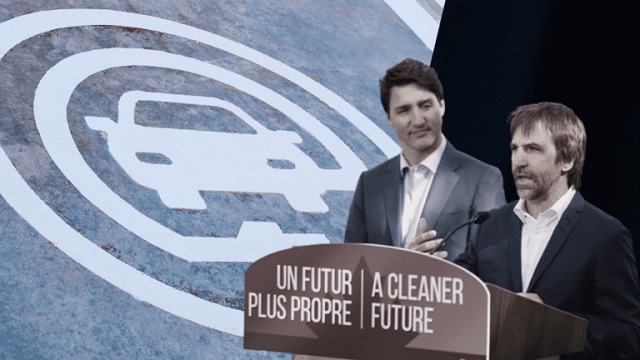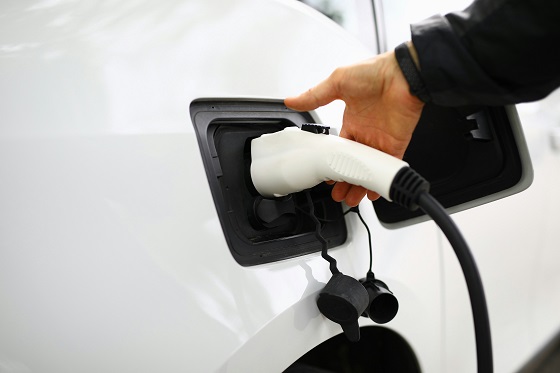Automotive
The electric vehicle mandate: Another counterproductive climate policy to cap off 2023

From the MacDonald Laurier Institute
With just a handful of days left in 2023, the government couldn’t help but introduce one more unrealistic and counterproductive climate policy. Canada’s Minister of Environment and Climate Change, Steven Guilbeault, just announced an electric vehicle mandate that will restrict and then prohibit the sale of non-ZEV (zero-emissions vehicles) by 2035.
The Macdonald-Laurier Institute’s Director of Energy, Natural Resources, and Environment, Heather Exner-Pirot, said of the government’s new mandates: “Of all the Soviet-style, top-down, market-defying policies they have implemented this year, this may be the most egregious.”
What’s so terrible about the new regulations?
For starters, they explicitly privilege EV technology but disregard broader environmental considerations. An electric vehicle like the Ford F-150 Lightning will still be able to be sold in Canada in 2035, but a Honda Civic with an internal combustion engine will be banned – this fails to consider the life-cycle emissions (total emissions of a given product throughout production, use, and disposal) of the two vehicles.
The new regulations also ignore the reality that many Canadians (renters, those living in apartment buildings/condos or in rural areas) won’t likely be able to charge at home. There are massive logistical and cost barriers to the adoption of EVs for many (if not most) Canadians.
Living up north where extreme cold can affect the performance of EV batteries? The Government acknowledges your concern but is blindly confident that the technology will get better (so stop whining and get on board…).
Finally, the government’s new regulations ignore the need for coordination between the provinces and between Canada and the US.
Automotive
Major automakers push congress to block California’s 2035 EV mandate

 MxM News
MxM News
Quick Hit:
Major automakers are urging Congress to intervene and halt California’s aggressive plan to eliminate gasoline-only vehicles by 2035. With the Biden-era EPA waiver empowering California and 11 other states to enforce the rule, automakers warn of immediate impacts on vehicle availability and consumer choice. The U.S. House is preparing for a critical vote to determine if California’s sweeping environmental mandates will stand.
Key Details:
-
Automakers argue California’s rules will raise prices and limit consumer choices, especially amid high tariffs on auto imports.
-
The House is set to vote this week on repealing the EPA waiver that greenlit California’s mandate.
-
California’s regulations would require 35% of 2026 model year vehicles to be zero-emission, a figure manufacturers say is unrealistic.
Diving Deeper:
The Alliance for Automotive Innovation, representing industry giants such as General Motors, Toyota, Volkswagen, and Hyundai, issued a letter Monday warning Congress about the looming consequences of California’s radical environmental regulations. The automakers stressed that unless Congress acts swiftly, vehicle shipments across the country could be disrupted within months, forcing car companies to artificially limit sales of traditional vehicles to meet electric vehicle quotas.
California’s Air Resources Board rules have already spread to 11 other states—including New York, Massachusetts, and Oregon—together representing roughly 40% of the entire U.S. auto market. Despite repeated concerns from manufacturers, California officials have doubled down, insisting that their measures are essential for meeting lofty greenhouse gas reduction targets and combating smog. However, even some states like Maryland have recognized the impracticality of California’s timeline, opting to delay compliance.
A major legal hurdle complicates the path forward. The Government Accountability Office ruled in March that the EPA waiver issued under former President Joe Biden cannot be revoked under the Congressional Review Act, which requires only a simple Senate majority. This creates uncertainty over whether Congress can truly roll back California’s authority without more complex legislative action.
The House is also gearing up to tackle other elements of California’s environmental regime, including blocking the state from imposing stricter pollution standards on commercial trucks and halting its low-nitrogen oxide emissions regulations for heavy-duty vehicles. These moves reflect growing concerns that California’s progressive regulatory overreach is threatening national commerce and consumer choice.
Under California’s current rules, the state demands that 35% of light-duty vehicles for the 2026 model year be zero-emission, scaling up rapidly to 68% by 2030. Industry experts widely agree that these targets are disconnected from reality, given the current slow pace of electric vehicle adoption among the broader American public, particularly in rural and lower-income areas.
California first unveiled its plan in 2020, aiming to make at least 80% of new cars electric and the remainder plug-in hybrids by 2035. Now, under President Donald Trump’s leadership, the U.S. Transportation Department is working to undo the aggressive fuel economy regulations imposed during former President Joe Biden’s term, offering a much-needed course correction for an auto industry burdened by regulatory overreach.
As Congress debates, the larger question remains: Will America allow one state’s left-wing environmental ideology to dictate terms for the entire country’s auto industry?
Automotive
Canadians’ Interest in Buying an EV Falls for Third Year in a Row

From Energy Now
Electric vehicle prices fell 7.8 per cent in the last quarter of 2024 year-over-year, according to the AutoTader price index
Fewer Canadians are considering buying an electric vehicle, marking the third year in a row interest has dropped despite lower EV prices, a survey from AutoTrader shows.
Forty-two per cent of survey respondents say they’re considering an EV as their next vehicle, down from 46 per cent last year. In 2022, 68 per cent said they would consider buying an EV.
Meanwhile, 29 per cent of respondents say they would exclusively consider buying an EV — a significant drop from 40 per cent last year.
The report, which surveyed 1,801 people on the AutoTrader website, shows drivers are concerned about reduced government incentives, a lack of infrastructure and long-term costs despite falling prices.
Electric vehicle prices fell 7.8 per cent in the last quarter of 2024 year-over-year, according to the AutoTader price index.
The survey, conducted between Feb. 13 and March 12, shows 68 per cent of non-EV owners say government incentives could influence their decision, while a little over half say incentives increase their confidence in buying an EV.
-

 2025 Federal Election1 day ago
2025 Federal Election1 day agoMark Carney: Our Number-One Alberta Separatist
-

 2025 Federal Election1 day ago
2025 Federal Election1 day agoNine Dead After SUV Plows Into Vancouver Festival Crowd, Raising Election-Eve Concerns Over Public Safety
-

 2025 Federal Election2 days ago
2025 Federal Election2 days agoColumnist warns Carney Liberals will consider a home equity tax on primary residences
-

 International2 days ago
International2 days agoJeffrey Epstein accuser Virginia Giuffre reportedly dies by suicide
-

 2025 Federal Election1 day ago
2025 Federal Election1 day agoCanada is squandering the greatest oil opportunity on Earth
-

 International22 hours ago
International22 hours agoU.S. Army names new long-range hypersonic weapon ‘Dark Eagle’
-

 Business14 hours ago
Business14 hours agoOttawa’s Plastics Registry A Waste Of Time And Money
-

 Addictions12 hours ago
Addictions12 hours agoFour new studies show link between heavy cannabis use, serious health risks

